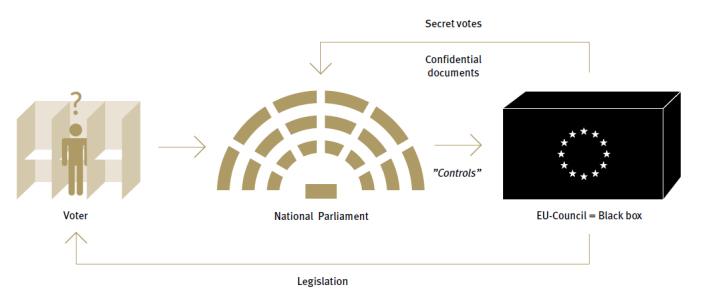Rapporteurs make the case for more transparency in the EU
Members of Parliament are unable to monitor the EU effectively at present. This is particularly true of the consultations and negotiations between member states on new European legislation in areas such as agriculture, pensions and migration policy. Documents are not routinely made public, for example.
Position Paper on transparancy in the EU

This is the conclusion of the MPs Pieter Omtzigt (CDA), Renske Leijten (SP) and Martin van Rooijen (50PLUS) in a position paper that they drafted in their capacity as rapporteurs on the theme of transparency in the EU. On Monday 27 November, the rapporteurs will present their findings during a meeting of all of the EU’s committees on European Affairs in Tallinn. At the meeting, they will propose that parliaments join forces and ask the EU to take a number of concrete steps, allowing citizens more insight into Europe.
Black Boxes
In their memorandum, the rapporteurs write that bodies such as the EU Council of Ministers function like ‘black boxes’. It is unclear how negotiations proceed and exactly how policy is made. The negotiations on the EU pensions directive, for example, lasted for years. The House of Representatives was continuously briefed on the developments, but the final text of the agreement was only made public shortly before the definitive decision was taken. This left far too little time for civil society and the House of Representatives to be able to examine it properly.
It is important that citizens and MPs are able to see what is happening in Europe and the contribution that the Dutch government is making to this. For this reason, the rapporteurs want transparency to be improved. In their position paper, they set out a number of concrete proposals for achieving this. The proposals are based on scholarly and legal analyses that were made for the House of Representatives over the past year.
Joint EU initiative
The MPs now want to put the proposals for greater transparency to the EU, by way of a joint initiative with other EU parliaments. It is the first time that a parliament in the EU has attempted to use inter-parliamentary cooperation to give citizens more influence on Europe. The MPs want EU bodies to comply with their own legislation, for example: in principle, documents should be made accessible to the public as quickly as possible. By means of the joint action, they hope to encourage the EU Council of Ministers to implement reforms.